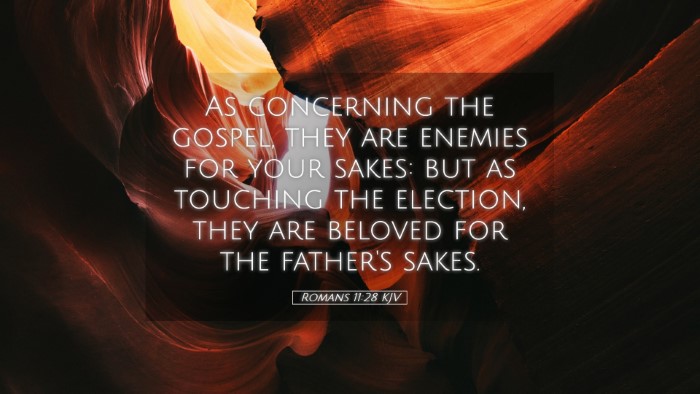Romans 11:28 - A Commentary
Verse Text: "As concerning the gospel, they are enemies for your sakes: but as touching the election, they are beloved for the fathers' sakes."
Introduction: The Apostle Paul's epistle to the Romans encapsulates profound theological principles and provides a critical understanding of God's relationship with Israel and the Gentiles. Romans 11:28 serves as a vital verse within this context, establishing the duality of Israel's position in relation to the Gospel and God's eternal promise.
Understanding the Context
This verse appears within the larger discourse of Romans 11, where Paul addresses the concept of Israel's temporary disobedience and the profound mystery of God's salvation plan. Paul has been expounding on how Israel, despite its rejection of Christ, remains part of God's elect community due to the patriarchs: Abraham, Isaac, and Jacob.
The Duality of Israel's Status
Paul outlines two critical perspectives regarding Israel:
- Enemies for Your Sake: The term "enemies" signifies Israel's current opposition to the Gospel message. While they have turned away from the truth of Christ, their opposition serves to further the mission to the Gentiles.
- Beloved for the Fathers' Sake: Despite their hostile stance towards the Gospel, they are still deemed 'beloved' by God. This reflects God's unchanging covenant and mercy toward the ancestors of faith.
Insights from Matthew Henry
Commentator Matthew Henry emphasizes the mystery of Israel's disobedience, indicating that while they appear as foes to the Gospel, their historical identity as God's chosen people remains intact. He states:
"They are not rejected, but their present blindness is made to conduce to the conversion of the Gentiles; so that both Jews and Gentiles are made one in Christ."
Moreover, Henry highlights that God’s promises remain secure. He acknowledges the intricacies of divine election, where God's covenant with Israel stands firm despite their collective rejection of the Messiah.
Insights from Albert Barnes
Albert Barnes, in his commentary, expands upon the notion of enmity and election. He notes that:
"This enmity is providentially overruled for good. Though they oppose the Gospel, it is for the benefit of the Gentile nations who have been grafted into the blessings originally meant for Israel."
Barnes further elucidates the theological implications, suggesting that God’s enduring love for Israel should encourage the confidence of believers as they witness God’s faithfulness to His promises throughout history.
Insights from Adam Clarke
Adam Clarke provides a more exegetical approach, focusing on the original Greek terms used in the text. He interprets the idea of “enemies” as not absolute. Clarke states:
"The enmity is not a separation from God's covenant love, rather a phase in God's redemptive plan where their fall leads to greater grace for the Gentiles."
Clarke stresses the lasting significance of the patriarchal covenant, arguing that God's benevolence towards the Jewish people is a testament to His fidelity and a foreshadowing of their eventual restoration.
Theological Implications
This verse helps frame several broader theological themes:
- The Sovereignty of God: The juxtaposition of enmity and divine election highlights God's sovereign control over salvation history.
- The Role of Israel: The continued significance of Israel in the divine plan underscores the importance of contextual scripture interpretation.
- God’s Covenant Faithfulness: The perpetuation of God's promise to the patriarchs serves as assurance of His character and motivationally calls believers to remain steadfast in faith.
Pastoral Applications
For pastors and spiritual leaders, Romans 11:28 offers robust material for teaching on grace, mercy, and the character of God as immutable. It encourages a compassionate approach toward those who resist the Gospel, understanding that their rebellion serves a greater redemptive purpose.
Moreover, the concept of election should instill hope and humility within the church. By recognizing that God's plans transcend human failure, congregations can foster a trusting faith in divine providence.
Finally, the implications for intercessory prayer resonate deeply. As Paul's personal concern for Israel illustrates, believers are called to pray for the salvation of all souls, knowing that God's mercy extends far beyond visible opposition.
Conclusion
Romans 11:28 encapsulates the tension between divine sovereignty and human agency. It stands as a confirmation of God's unending faithfulness to His chosen people and serves as a reminder of the inclusivity and scope of the Gospel. Through insights drawn from public domain commentaries, this verse calls us to a deeper understanding of God's glory revealed through the mystery of salvation history.


